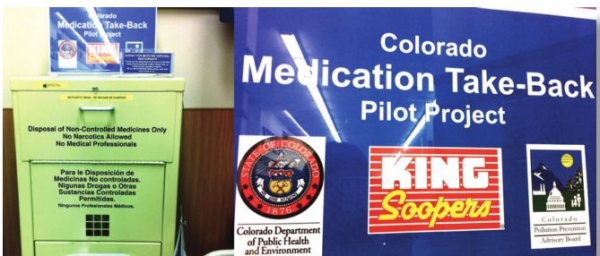
We all know what to do with plastic boxes, beer cans and glass bottles: recycle them. But what about recycling medication?
Dr. David Norris, a faculty member in the Department of Integrative Physiology at the University of Colorado Boulder, conducted a study showing that chemical pollutants from household products and pharmaceuticals that were not disposed of properly have made their way into waterways.
Norris and his team monitored male fishes in the Boulder Creek that have been developing female characteristics, resulting in a decline in the number of male fishes. According to Norris, this change can be directly related to the increasing levels of chemicals coming from household products such as medications. The ongoing project started in 2000.
The types of chemicals found in the water consisted of two groups. The first group is estrogenic, which act like natural estrogens in our bodies, he says. That includes the natural estrogens excreted by all adult men and women; pharmaceutical estrogens found in birth control pills; phthalates from personal care products like shampoo, cosmetics, toothpaste, certain plastics and latex paints; bisphenyl A (BPA) from food can linings, plastics, thermal inks and dental sealants; and some pesticides.
The other type is made of neuroactive chemicals, often referred to as antidepressants, and includes fluoxetine, the active ingredient in many formulations such as Prozac. These chemicals find their way into the water system through the various materials we rinse in our sinks or dump in our drains, or simply through excretions.
“These antidepressants pass through our bodies, pass through the waste water treatment plants, and accumulate in fish brains downstream of wastewater treatment plants, including Boulder Creek,” Norris
says in an email interview about the study. “The effects we are now
seeing in wildlife reflects what is happening in our bodies when we
subject ourselves to the chemicals that eventually are passed downstream
to the fishes. We have hundreds of scientific publications that not
only document these effects in wildlife but show parallel correlations
in human health. They are manifest in birth defects, in earlier puberty,
in altered sex ratios at birth, in increased incidences of reproductive
cancers, in learning defects. … Need I go on?” Some experimental
studies have shown that the levels of estrogen in the water are working
as contraceptives, in addition to having a feminization effect or
blocking reproduction.
One study documented the elimination of an entire species of fish from a lake in Canada.
“These
anthropogenic chemicals can upset the natural balance in ecosystems,”
Norris says. “Unstable ecosystems can reduce food resources and
recreational opportunities for humans.”
To
prevent the impact on the environment, sustainability advocates advise
against disposing of unwanted pharmaceuticals down the drain.
“If
you have no other means of disposing it, pour liquid medication over
cat litter, let it dry and place it in the trash,” says Kai Abelkis, the
sustainability coordinator at the Boulder Community Hospital who has
been working to help reduce waste and promote sustainability in the
community. “Keep pills in their original containers and seal it shut
with household glue before disposing it in the trash.”
Although
it has been advised in the past that people dispose of their medication
down the drain or toilet, the chemicals in those medications are able
to find their way into the water system, says Nick Grossman,
communications specialist in the Public Works division for Boulder.
“The
city is equipped with waste water treatment plants that clean a
majority of the water,” Grossman says. “However, it was not designed to
fully remove trace amounts of compounds that exist in the water, and
these compounds end up downstream.”
Boulder
Community Hospital, in partnership with the city of Boulder, runs a
pharmaceutical collection program. The program aims to collect old,
expired or unwanted medications for proper disposal.
“I
think it is important to bring awareness to the community and
understand that water is life,” Abelkis says. “As a society, we should
be responsible for the products that we purchase, as well as the
products that we don’t need anymore.”
In
2011, approximately four large barrels of medication, four 5-gallon
buckets of mercury, sharps, aerosols and oxidizers were properly
disposed, according to city of
Boulder reports. In the year before that, more than 230 people showed
up to dispose of approximately 60 gallons of liquid medication and more
than 52 pounds of solid pharmaceuticals.
Pharmacists
and law enforcement officers are present to ensure medication retrieved
on the day is safely collected and rightly disposed of.
Abelkis warns that although they generally accept most types of medications, they do not take narcotics.
“The
police officers are there to monitor for narcotics, which we are not
allowed to take back,” he said. “With that being said, it is pretty
interesting to see the types of medication that people bring to us, some
of them even dating back to the ’50s.”
Aside
from the pharmaceutical take back event, there is a drop-box for drugs
at the King Soopers on 30th Street and Araphaoe Avenue for people to
dispose of their unwanted medication, Abelkis says.
Norris
suggests that the community should take it a step further and be aware
of their daily decision-making. He recommends the following:
• Choose what products we purchase and use to avoid many of these chemicals.
•
Reduce use of many products (for example, how much shampoo is really
necessary to get your hair clean) to lessen the amounts going down the
drain.
• Pressure government to ban the use of known offending chemicals.
•
Work harder to control population and develop create ways to disperse
waste treatment to avoid point source dumping into streams and rivers.
• Demand upgrades of those wastewater treatment plants using antiquated technologies.
• Stress the need for a sustainability oriented economy.
•
Elect representatives to government that recognize the problem and are
pledged to really work to solve it and improve the environment.
Respond: [email protected]














